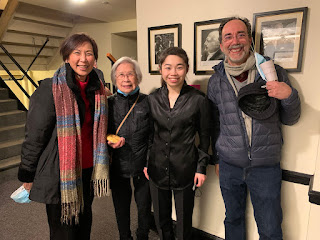When I lived in Hong Kong, I found it amusing that visitors would often and repeatedly comment on how striking they found the clusters of skyscrapers of housing estates. So I find it amusing, now, that on the ride in from the airport, I, too, found the clusters of 30-plus story skyscrapers notable. The fact that I notice these buildings which I once took for granted shows that I no longer belong in Hong Kong. And yet, everything seems so familiar, like I never left.
The PCR testing process itself was amazingly fast. I simply walked in, showed the staff member my Hong Kong ID and the appointment confirmation SMS text message on my phone. The staff person, who was behind a plastic barrier, entered my ID number and a code number from the SMS text on their keyboard, and my personal particulars (including my phone number) then appeared on a screen that was set facing me (none of the silly swiveling of the screen as in doctors’ offices in St Louis). She gave me a vial, which I then took down a line about 20 meters, and a “dispatcher” told me which of about 20 cubicles (temporary cloth medical stations) to go to for my test. Each time I arrived, the tester was still finishing up from the previous test and putting on new gloves. They took a swab of both sides of my nose, and with a second swab took a sample from my throat (“Say ‘Ah’”), and then, “You’re done, thank you” and I could leave. I don’t think it even took 3 minutes.
 |
| Surgical mask holder |
Days before leaving for HK, I received the Congressional-ExecutiveCommission on China report on human rights in Hong Kong titled Hong Kong’s Civil Society: From an Open City to a City of Fear. As a cover letter put it:
The report, entitled Hong Kong’s Civil Society: From an Open City to a City of
Fear, draws on interviews with 42 current and former
members of Hong Kong’s civil society and details how the draconian enforcement
of the National Security Law crushed democratic institutions and a once vibrant
civil society in Hong Kong.
The report is depressing reading, describing the jailing of politicians and activists for organizing a primary (which the government claims is “subversion”), the disbanding of many NGOs, children coming home saying their teachers told them to report if parents criticized China’s flag, and journalists forced to leave because of police harassment.
 |
| Touchless elevator pad |
One friend, who had been quite supportive of the protests when I saw him three years ago (and probably would still be considered “yellow”), has traveled to the UK for work and commented that the Hong Kong friends who have emigrated are, in his view, overly negative on Hong Kong. It seems everyone needs to justify their choice: those who stay say it is not so bad, those who left emphasize how much it’s changed and how bad it’s become.
Now that the protests have been suppressed, perhaps it is easier to add some nuance, and not see them in simple bipolar terms of good versus evil, or democracy versus autocracy. Already in 2020, a special section in the anthropology journal HAU (issue 10[2]) offered some nuance on the protests. Many of the protesters were xenophobic and anti-Mainland Chinese, and a large number loved Trump (because of his anti-China stance). And though authorities will not admit it (because they “won”), much of the violence was caused by the government’s intransigence and by the police. The violence from a minority of the protesters probably doomed the protest movement.
I can see that people who, for family or work or other reasons cannot or do not want to emigrate, are coming to terms with the new reality. One Chinese friend (who is my age and who had emigrated to Australia in the 1990s to get his citizenship and then returned to Hong Kong) was surprised that his sons’ friends all supported the protests. He is relatively moderate and sympathized with aspects of the protests, but the protest movement appealed especially to youths. Yet, neither he, nor his sons (who graduated from university in Australia) are considering moving to Australia. My friend said he is disgusted with the “Mainlandization” of the government, with officials now speaking like CCP officials. He commented that because they did not do so right after 1997, when perhaps it could have been logical to make such a change, the patriotic language and public service announcements on TV in 2022 are quite jarring. But he’s not leaving.
Another young friend, educated in the US, complained bitterly of the government bureaucracy and rigidity with Covid regulations, but he admitted he would not leave Hong Kong, because his skills and bilingualism are only an advantage in Hong Kong.
The fact is, we all live in flawed societies. I live in a city that still has a gaping racial divide, where White kids in the suburbs go to excellent public and private schools while Black kids in north St Louis go to schools that in the recent past were so bad that the state had to take themover. Guns are so common that I sometimes hear shots fired at night. On the social network NextDoor, I read last week that two teenagers drove up to a gas station near my neighborhood, and one of them jumped into a car and stole it (here is a video of a similar incident at the same station). One of the first replies on NextDoor was that the owner should have had a gun! (Right, so she could shoot her own car and perhaps kill the teenager and maybe some innocent person walking by.) Today there was a mass shooting in a St Louis high school: three dead, six injured. I live in a country that is also entering a deeply xenophobic phase, where minorities are attacked and immigrants who have worked here (usually also paid income taxes) for decades have no path to citizenship. I live in a country where supposedly intelligent people continue to assert, without any evidence, that the 2020 election was stolen from Trump (despite the fact that Republicans did well in all the other races). I live in a country that claims to be a democracy and yet corporations and the wealthy can spend unlimited amounts in political ads and lobbying (see e.g. Leonard Leo’s $1.6 billion fund). And I live in a country where most people are going to vote for their tribe (red or blue) rather than based on the qualifications and policy proposals of candidates.
Americans like to think that the US is such a great country that everyone wants to come here, but according to a report titled Caught in the Crossfire: Fears of Chinese-American Scientists, government harassment of scholars of Chinese descent has led to an exodus:
“The China Initiative caused panic
and an exodus of senior academic researchers of Chinese descent in the US.” The
number who dropped their American academic or corporate affiliation in 2021 in
favor of a move back to a Chinese institution jumped by 23 percent over 2020.
In 2021, 1,500 Chinese scholars who were educated in the United States left to
go back to China."
Many Americans seem to believe the political rhetoric that the US is the greatest country in the world, and believe everyone wants to come to America. In fact, the vast majority of people want to stay home close to family and friends, and most refugees who come to America are driven out by violence and other problems at home.
It is easy, from the US, to imagine it is hard to live in an authoritarian place like Hong Kong. Yet many Americans are perfectly willing to retire to an autocracy like Dubai:
A sunshine-filled city, Dubai offers an outstanding quality of life for retirees. The city is famed for its friendly, multicultural population and array of lifestyle experiences that put convenience at the forefront – think on-demand home services and food delivery at the touch of a button. (From Retire in Dubai website)
Retire amid sunshine and cheap labor; all you need is
US$500,000 in the bank, and an income of at least US$60,000 per year. Why worry
about freedom?
The CECC report quotes an anonymous professor as saying “Hong Kong has changed from an open society to one in which people are gripped by fear. And the fear is encompassing.” This is certainly true for some. But most people are not activists or directly involved in politics. It is startling to realize that for many people, life seems to go on as before. Even if they are not happy about the National Security Law, what can they do?
 |
| Science Park: new buildings |
People get used to almost anything. My sense is that people in Hong Kong will adapt. Like many in China, they will continue to hope that the government will reform, will open up. They will push at the margins; no street protests, but passive resistance, like the non-compliance with scanning the QR code in entering buildings. Hong Kong survived fairly draconian crackdowns under the British. Many hope it will survive this round of crackdowns, too.

.jpg)


.jpg)











small.jpg)



